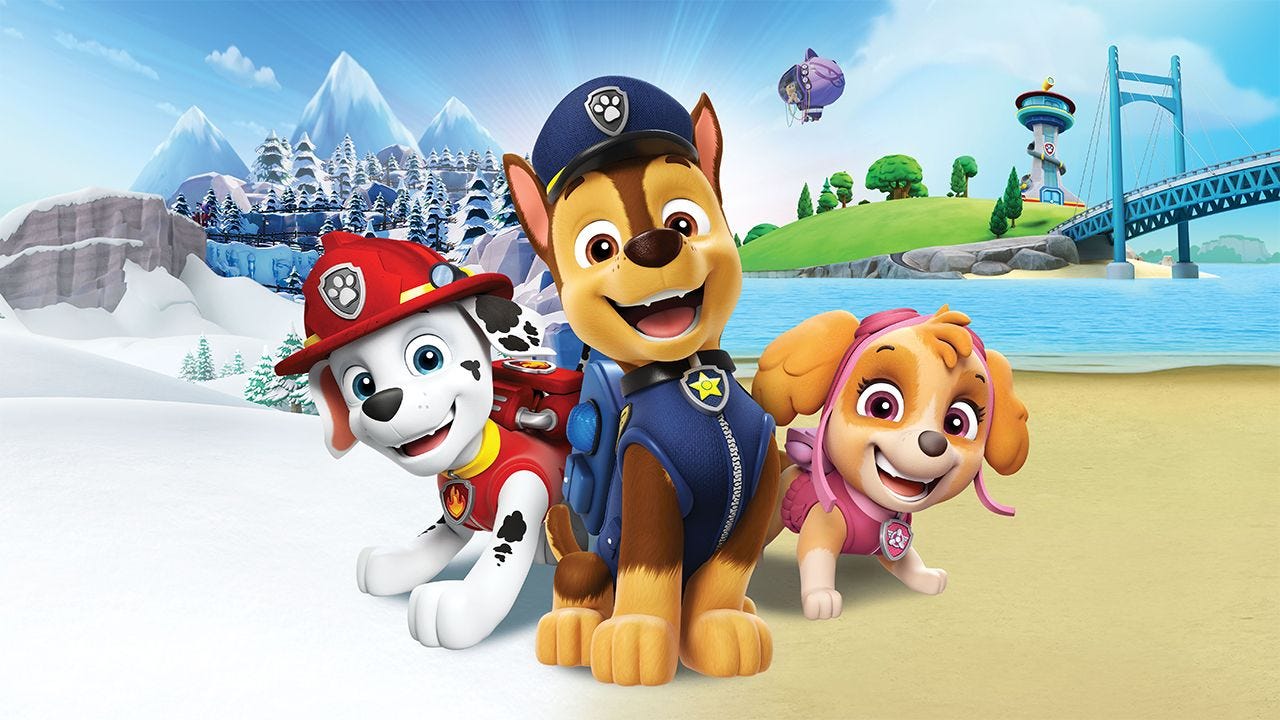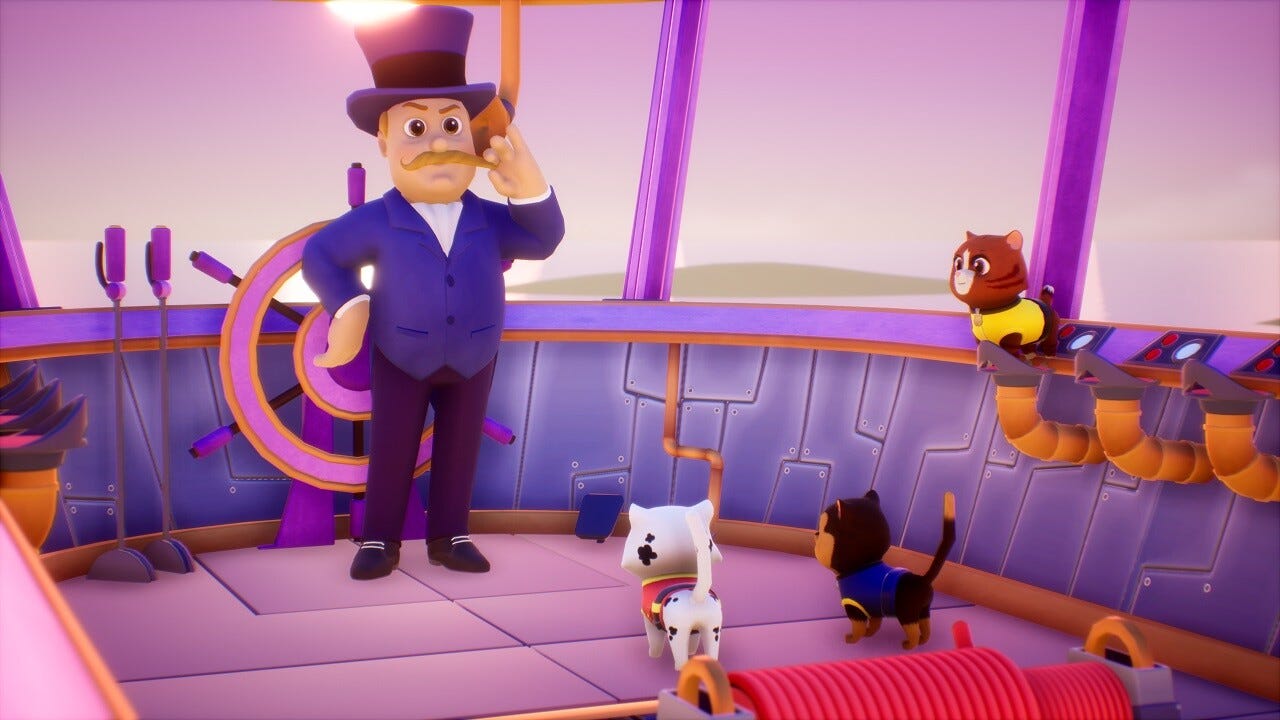What It's Like to Make a PAW Patrol Video Game
A producer on the upcoming PAW Patrol World explains how making games for children is different, right down to the way the camera is controlled.
This Friday, a new PAW Patrol game, called PAW Patrol World, arrives. There have been previous PAW Patrol games of varying quality, and it is also not a coincidence that PAW Patrol World, which puts players into a wider space than previous games, is coming on the same day the new movie, PAW Patrol: The Mighty Movie, is released.
(The last movie was decent, for what it is? I’m hoping for the same here, because inevitably I will find myself at a theater with two kids watching this sometime soon.)
What remains to be seen is if PAW Patrol World is any good. The game’s publisher, Outright Games, dubs themself a “family-run global video game publisher, making family friendly interactive entertainment with the biggest franchises in the world.” The “biggest franchises” part is, at least, true; in the past, Outright Games has produced games based on Cocomelon, Rainbow High, Baby Shark, Peppa Pig, and more.
In fact, they even have a Bluey game coming! It’s a real who’s who of child properties.
One of the reasons I started Crossplay was to help parents, caregivers, and others try to make sense of the video games around them, whether it’s determining if a game is any good, to the ethics of playing them at all. I don’t have access to PAW Patrol World yet, though I’m hoping to check it out before its release. Worst case, after it’s out! But regardless, we’ll be touching on both topics this week; in a few days, I’ll publish a piece I’ve so far dubbed “The PAW Patrol Question,” touching on what it means to bring media you may disagree with, like PAW Patrol’s depiction of police, in the home.
But first, I’ve got an interview with PAW Patrol World producer Martin Willingham.
This happened earlier this year over email, back when the game was first announced, so excuse some of the stuffy feeling of the exchange. My hope is this helps open the door to further conversations like this down the road. Crafting a game aimed at young kids is its own specific beast, and I’m hoping to learn more about that process here, even for the kinds of games that we take for granted when they show up on shelves.
Crossplay: What defines PAW Patrol and makes it workable for a video game?
Martin Willingham: We feel that PAW Patrol’s identity is about working together to solve problems and that’s of course an excellent message not just for kids, but for everyone. There are situations where Marshall will excel, or other situations where Rubble is needed, or problems that need the support of the unique flying abilities of Skye. It’s a great foundation for a video game, where you identify a problem, create a plan to fix it with a range of tools at your disposal, and then execute that plan effectively to succeed.
Paw Patrol World reminds me of the kinds of video games we used to get more commonly in older eras of video games. Many licensed games these days are mobile apps or "prestige" games, like Batman Arkham Asylum. Do you have any nostalgia for this different era of licensed games, and is PAW Patrol World pulling from them?
Willingham: Thinking back to that era, I remember playing a lot of those great licensed games in couch co-op with family and friends. Bringing that magic forward to a modern audience in an age of online gaming is a fantastic way to honour that legacy. Especially with all the new awesome licensed IP that has sprung up since that era, like PAW Patrol and Peppa Pig.
Outright Games seems to largely focus on kids games, like Cocomelon, Peppa Pig, and Paw Patrol. What does it mean to make a video game targeted at kids? How does it change your design approach and philosophy?
Willingham: For Outright Games, making a game designed for kids means that it’s age appropriate, family friendly and of a high quality that kids want to play. It’s all about making things as fun as they can be, while keeping in mind who will be playing it. It needs to be fun without being too complicated, but it needs to have enough complexity so the whole family can enjoy playing together.
When it comes to design, accessibility is at the front of our minds. We think, “What are the barriers that may limit the playability of this game?” Getting the controls right is crucial, which is why we focus test all of our games with the target audience of kids. We implement different control schemes when it makes sense, such as a simplified camera system in the case of PAW Patrol World. This can help to remove a level of complexity that might get in the way of the enjoyment of some younger players. It’s also incredibly important to ensure our games have full voice overs available so that younger kids who may not be confident readers don’t miss out on the dialogue or story of our games.
“When it comes to design, accessibility is at the front of our minds. We think, “What are the barriers that may limit the playability of this game?” Getting the controls right is crucial, which is why we focus test all of our games with the target audience of kids. We implement different control schemes when it makes sense, such as a simplified camera system.”
What age group would you describe PAW Patrol World as being aimed at, knowing the wider appeal of the franchise? And how does knowing different groups might play the game influence how you're making it?
Willingham: PAW Patrol World has been made with children aged 4-8 as the primary audience and it has a PEGI 3 rating. While this entry into the PAW Patrol series is aimed at younger gamers, we want to make sure that older siblings, parents, and other family members can all enjoy playing together.
Keeping this in mind, PAW Patrol World allows for 2-player couch co-op which has been designed to allow older players to join in and play alongside their siblings or children seamlessly.
When designing a game like PAW Patrol World, how often are you trying to find ways to ensure it's also fun for adults, knowing they're likely to be playing the game with their kids?
Willingham: While we have the option for older gamers to play alongside their younger sibling or kid, this is definitely a tricky thing to balance. Ultimately, a younger audience is the focus of the game and we wouldn’t want to risk complicating it in a way that makes it difficult for kids to play alone.
However, we feel the co-op experience leaves plenty of room for older players to enjoy themselves, especially with the storyline and range of activities to complete. We also have included really engaging collectables, lots and lots of fun extras to discover that older completionists like to chase after.
You're making a video game to be enjoyed largely by children, not adults. What is it like to work on a video game like that, and how do you find satisfaction making a game that, in many ways, isn't targeted at you?
Willingham: So much of the enjoyment comes from the creative process itself and knowing that there will be millions of kids out there who enjoy the end product. Many of us started gaming when we were younger, playing these very types of games and we loved them! So having the opportunity to craft those experiences for a whole new generation of players, some who may be picking up a controller for the first time, is very special and drives a lot of what we do.
Have a story idea? Want to share a tip? Got a funny parenting story? Drop Patrick an email.
Also:
My youngest is three and a half, so maybe the perfect age for this? She hasn’t tried to hold a controller meaningfully before, so we’ll see what happens here.
The point about having fully voiced VO for kids who can’t fully read yet hits home, and I’ll probably end up writing about this point with games very soon.
If you have strong feelings on PAW Patrol, drop me an email this week.







My daughter is almost aged out of Paw Patrol, but I have the feeling she'll demand this if she finds out about it. Hoping to keep it on the DL and distract her with that Bluey trailer.
I’ve never watched paw patrol with my daughter. But if it paints policing in a positive light, we will probably start.